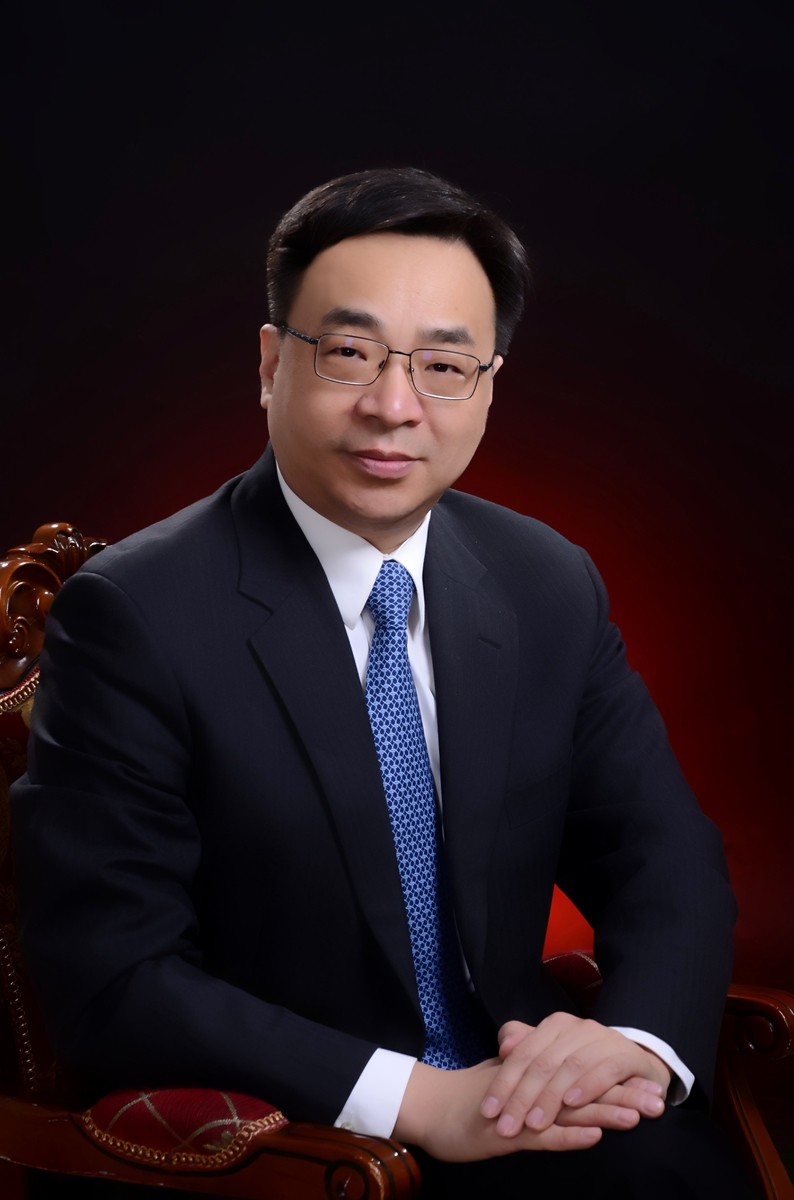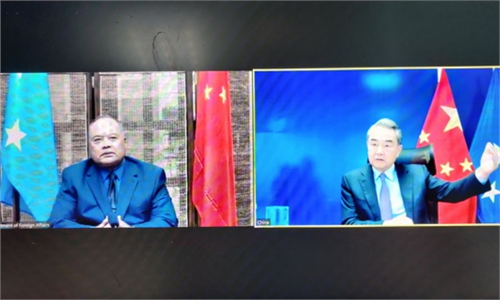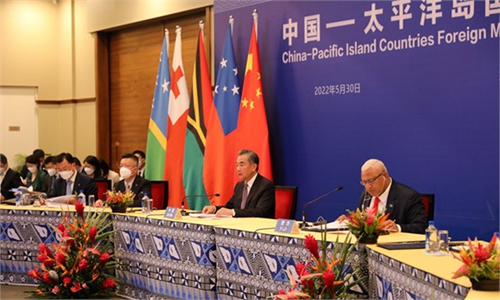China's cooperation with Micronesia yields tangible results, generally welcomed: ambassador
Foreign Minister’s ‘cloud visit’ to further boost mutual trust, bilateral ties

View of Marshall Islands, Micronesia Photo: VCG
Editor's Note:
In recent years, China-Micronesia bilateral ties have seen rapid development, with pragmatic cooperation expanding in a wide range of areas. Ahead of Chinese State Councilor and Foreign Minister Wang Yi's "cloud visit" to Micronesia, Global Times (GT) reporter Yin Yeping had an exclusive interview with Chinese Ambassador to Micronesia Huang Zheng (Huang) on current bilateral ties and the prospect for future cooperation.

Chinese Ambassador to Micronesia Huang Zheng Photo: Courtesy of embassy
GT: How do you view current ties between China and Micronesia? How Wang's "cloud visit" will help further boost bilateral cooperation?
Huang: China and Micronesia are both in the Asia-Pacific region and are developing countries. We are good friends and partners seeking equality, mutual benefit and common development. China attaches great importance to developing friendly relations with Micronesia, which is in line with the fundamental and long-term interests of both sides, and is also conducive to promoting peace, stability and prosperity in the Asia-Pacific region.
China and Micronesia established diplomatic relations in 1989. During President Xi Jinping's two visits to Pacific island countries in 2014 and 2018 and group meetings with leaders of the island countries that established diplomatic relations, China and Micronesia successively established a strategic partnership and upgraded it to a comprehensive strategic partnership, opening a new chapter in China-Micronesia relations.
At present, China-Micronesia relations are showing good development momentum, and the comprehensive strategic partnership is constantly deepening. Wang's visit will further enhance political mutual trust between China and Micronesia, push cooperation in various fields to a new level, inject new impetus into the long-term development of bilateral relations, and make positive contributions to the peace, stability and development of the Asia-Pacific.
The important message from this visit is that China will continue to pursue the "Four-pronged Adherence" in developing relations with Pacific island countries.
The first is to uphold equal treatment. China has always advocated that all countries, big or small, are equal, and will develop friendly relations with island countries upholding the concepts of justice, mutual benefit, sincerity and inclusiveness. China will regard island countries as an important part of South-South cooperation and an important partner in building a community with a shared future for mankind.
The second is to insist on mutual respect. China always respects the sovereignty and territorial integrity of the island countries, and respects their efforts to explore a development path that suits their own national conditions. In our exchanges and cooperation with the island countries, we do not interfere in the island countries' internal affairs, attach any political conditions, or seek any geopolitical self-interest.
The third is to adhere to win-win cooperation. China will continue to be an advocate, builder and promoter of the development of Pacific island countries, and is committed to deepening pragmatic cooperation with island countries in various fields. China is sincerely helping island countries to develop their economies, improve people's livelihood, and enhance their capacity for independent development, while sharing China's development dividends with them.
Fourth, China always adheres to openness and inclusiveness in diplomatic relations with the island countries. The South Pacific region should be a stage for cooperation, not an arena for vicious competition. China's cooperation with island countries is not aimed at any country. At the same time, we respect the various ties that the island countries have established with other countries, and are willing to carry out tripartite cooperation with other countries in and outside the region with an open attitude.
GT: Can you talk about specific cooperation projects, including those under the Belt and Road Initiative (BRI)? And how these projects benefit the local population?
Huang: After the establishment of diplomatic relations between China and Micronesia, especially since the relationship between the two countries was upgraded to a comprehensive strategic partnership in 2018, the practical cooperation between the two sides has made great progress.
First, the areas of exchange and cooperation have been continuously expanded, covering a wide range of fields, including trade and investment, marine environment, disaster prevention and mitigation, poverty alleviation, medical and healthcare, education, tourism, culture and other fields. Five pairs of sister provinces and states have been formed between China and Micronesia, and local exchanges and cooperation between the two sides have also yielded fruitful results.
Second, China and Micronesia signed the Memorandum of Understanding on jointly building the "Belt and Road" in 2018, and now China has become an important trading partner with the country. It is the fourth-largest destination for exports and source of imports for Micronesia. In 2021, overall bilateral trade volume increased by 24.2 percent year-on-year.
Third, China has long insisted on providing economic and technical assistance without any political conditions, and has implemented many key assistance projects, including roads, bridges, schools, government buildings, sports venues and agricultural demonstration parks, while providing material assistance in the form of aircraft, ships, vehicles, cultural and sports equipment. China has also provided training for hundreds of Micronesian people in various fields.
Fourth, since the outbreak of the COVID-19 pandemic, China has provided several batches of epidemic prevention materials and cash assistance to Micronesia, and assisted with the construction of 30 sets of quarantine booths.
China's pragmatic cooperation with Micronesia is based on the principles of sincerity, real results, affinity, good faith, mutual benefit and the goal of common development. This cooperation has achieved tangible results and is generally welcomed in Micronesia.
There are several good examples I would like to share with you here.
First, since 1998, 11 agricultural technical assistance projects have been successfully implemented, providing local people with technical demonstrations such as vegetable planting, pig breeding, and use of biogas. It is known as the "Golden Signboard" of China's assistance to Micronesia.
Second, a number of China-Micronesia friendship stadiums built in densely populated areas of Micronesia, providing people with ideal places for daily mass gatherings, sports and competitions, as well as community meetings, traditional festivals and cultural performances. The utilization rate is extremely high.
Third, China helped with the construction of the secondary road in Pohnpei and the reconstruction of the Karma Bridge, bringing huge improvements for local residents' travel, as well as safe roads for children to go to school.
Fourth, China helped with the construction of epidemic prevention and quarantine rooms near airports in various states, which greatly improved Micronesia's ability to deal with suspected COVID-19 cases, and became a key part of its construction of a primary epidemic prevention system. This has also enabled Micronesia to facilitate the return of citizens who have been stranded overseas for a long time due to the epidemic.
GT: How do you view the prospect for future cooperation between China and Micronesia?
Huang: Micronesia is located in the southward extension of the BRI, and is a member of the Pacific island countries that are China's important economic and trade partners. In recent years, bilateral trade between China and Micronesia has continued to expand.
The Micronesian government and the country's enterprises have actively participated in the China International Import Expo. The stock of China's investment in Micronesia is about $13.48 million, which has remained stable for many years. In the process of implementing China's economic and technical assistance projects in Micronesia, Chinese-funded enterprises have upheld the concept of mutual benefit, as well as promoting localized operation and procurement, while helping with local economic development and providing employment opportunities.
Of course, in the overall plan of economic, trade and investment cooperation between China and Pacific island countries, the bilateral amount between China and Micronesia is not large, which just shows that there is still a lot of space and potential for further cooperation between the two sides.
In addition to increasing China's direct investment in traditional fields such as fishing and tourism services, the two sides can also focus on exploring investment and cooperation in animal husbandry, aquaculture and agricultural product processing industries.
For example, China can introduce the agricultural technology that uses Juncao, which literally means "mushroom" and "grass," to grow mushrooms. This will help Micronesia to provide local cattle and sheep with high-quality feed.
Another example is the promotion of sea cucumber farming and processing of coconut and banana products in Micronesia, helping the country improve its agricultural production capacity and food security level.
China is willing to continue to vigorously promote the development of China-Micronesia economic and trade and investment cooperation based on the concept of common development and "teaching people how to fish instead of giving fish," so as to benefit the people of the two countries and help Micronesia achieve sustainable development.
China is willing to work with Micronesia to further intensify high-level exchanges and interactions of all levels, consolidate political mutual trust, expand practical cooperation, deepen people-to-people bonds in accordance with the important consensus reached by the leaders of the two countries, and jointly contribute to building a closer China-Pacific island community with a shared future.


